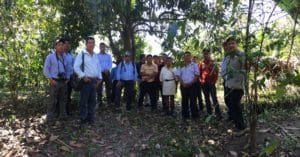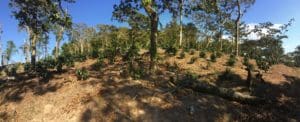We kicked off this trip in Chiapas Mexico visiting the cooperative union of Majomut, which lies 50 kilometers north of the beautiful colonial city of San Cristóbal de Las Casas. Established in 1983, Majomut (whose name translates to “land of birds”) is currently comprised of 974 members, with approximately 70 more members in transition to organic certification. Southern Chiapas is home to many indigenous Mayan communities who grow their coffee in the nearby municipalities of Chenalho’, Pantelho’, Tenejapa, Cancuc and Oxchuc. Like most producers in Mexico, Unión Majomut was hit extremely hard by Roya during the 2012/13 harvest and they continue to be affected by the fungus today. In just three years, the cooperative dropped production from 21 containers to just five. Since 2013, the group has been focused on increasing productivity and has implemented an interactive training program for members, enlisting 50 agriculture promoters who educate producer members. They focus on proper selection of cherry, nursery building and maintenance, quality control, worm composting as well as helping members to secure access to micro-financing.
This year production has increased slightly, as producers have been renovating their plots over the last several years. The group hopes to export eight containers this harvest. Each member has roughly 1 hectare of land, but yields are still quite low with an average of 1,000 pounds of parchment (equivalent to 10 quintales) per hectare. Currently, most producers are focusing on the production of Bourbon, Typica and Mondo Novo. Because the current coffee production still does not provide adequate income on its own, the majority of Majomut members have secondary jobs in a specific trade, such as equipment mechanics or carpentry.
Next, we traveled to the capital of Chiapas, Tuxtla Gutiérrez, to meet up with Andreas Kussmaul, head trader with Exportadora Café California and our long timer partner Karla Diab, of Westrade Corp. Our first stop was to the Cooperative Union de Ejidos y Comunidades San Fernando. This group was established in 1988, and is comprised of 1300 indigenous members, most of who produce coffee at an altitude between 1200 – 1600 masl. Women producers account for nearly 40% of total membership. This group is managed as an “ejido”, and functions a bit differently than a typical cooperative. Essentially, an ejido is a piece of land farmed communally under a system supported by the state and the group collectively makes decisions on how to farm their land. They are not interested in growing membership, as they believe growth will make it more difficult to assist individual producers adequately.
San Fernando members are very aware of the effects that climate change has on their crops. Witnessing firsthand how the earth’s rising temperature influences coffee production, community members realized the need for renovation about 12 years ago, long before the worst Roya hit the area. They began to see decreased yields and after seeking advice from an agricultural engineer, they decided to plant at higher elevations to achieve improved cup score and greater production per hectare. Currently, the group is focused on planting Costa Rica 95, Bourbon 300 and Pache Colis, and planting Catimor and Sarchimor in lower elevations. Producers have an average of 2 hectares and while under renovation, they can still produce between 8-15 quintales of parchment per hectare. Members who have gone through full renovation may see yields of 25 quintales per hectare, which is quite promising. San Fernando has their own dry mill, but export costs are increasing every year. They began working with Exportadora Cafe California several years ago to gain better access to the market as well as direct communication with the buyers who are looking for high quality certified coffees.
Our final stop in Mexico was to UCIPA (Unión de Comunidades Indigenas de Producción Agricola Santa Catarina Pantehlo) which is neither an ejido nor a community, but a producer group of nearly 1,000 members, most of whom are of the Tzetzal ethnicity. Similar to the other two groups we visited, UCIPA members are also in the process of renovations. They separate their parcels into four sections, renovating one quarter per year so they can maintain an active income from their land while replanting. UCIPA participates in a program managed by Exportadora Café California called Por Mas Café, which helps to provide farmers with pre-financing and technical assistance with the goal of yield improvements. Three years ago, their yields were approximately 3-5 quintales per hectare, and they expect to reach production of 20-25 quintales per hectare next year.
Our last day in Mexico was spent on a scenic drive through pine forests and (later) arid land, crossing the La Mesilla border and making our way into Guatemala, where we would spend the next week. Stay tuned for our Guatemala Trip report with all the details!

